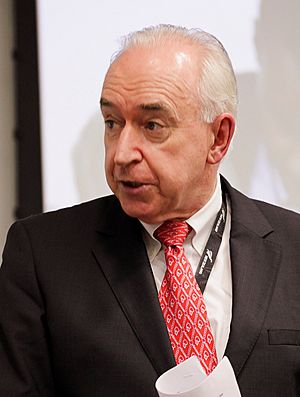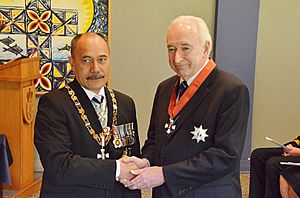Jim McLay facts for kids
Quick facts for kids
Sir Jim McLay
KNZM QSO
|
|
|---|---|
 |
|
| 24th Leader of the Opposition | |
| In office 29 November 1984 – 26 March 1986 |
|
| Prime Minister | David Lange |
| Deputy | Jim Bolger |
| Preceded by | Robert Muldoon |
| Succeeded by | Jim Bolger |
| 9th Deputy Prime Minister of New Zealand | |
| In office 15 March 1984 – 26 July 1984 |
|
| Prime Minister | Robert Muldoon |
| Preceded by | Duncan MacIntyre |
| Succeeded by | Geoffrey Palmer |
| 38th Minister of Justice | |
| In office 13 December 1978 – 26 July 1984 |
|
| Prime Minister | Robert Muldoon |
| Preceded by | David Thomson |
| Succeeded by | Geoffrey Palmer |
| 25th Attorney-General | |
| In office 13 December 1978 – 26 July 1984 |
|
| Prime Minister | Robert Muldoon |
| Preceded by | Peter Wilkinson |
| Succeeded by | Geoffrey Palmer |
| Member of the New Zealand Parliament for Birkenhead |
|
| In office 29 November 1975 – 15 August 1987 |
|
| Preceded by | Norman King |
| Succeeded by | Jenny Kirk |
| Personal details | |
| Born | 21 February 1945 Devonport, Auckland, New Zealand |
| Political party | National |
| Spouse | Marcy Farden |
| Children | Denis McLay |
| Alma mater | University of Auckland |
| Profession | Lawyer |
Sir James Kenneth McLay (born 21 February 1945) is a New Zealand diplomat and former politician. He held important roles in the New Zealand government. He was the ninth Deputy Prime Minister of New Zealand for a short time in 1984. McLay also led the National Party and was Leader of the Opposition from 1984 to 1986.
After leaving Parliament in 1987, he became a diplomat. In 2009, he became New Zealand's Permanent Representative to the United Nations. This means he represented New Zealand at the United Nations. Later, in 2015, McLay became New Zealand's Representative to the Palestinian Authority.
Contents
Early Life and Education
Jim McLay was born in Devonport, a suburb of Auckland, New Zealand. His parents were Robert and Joyce McLay. He attended King's College, Auckland and then studied law at the University of Auckland, finishing his degree in 1967.
After university, he worked as a lawyer. He also joined several law groups. In 1983, he married Marcy Farden. She used to work for an American politician named Daniel Akaka.
Becoming a Member of Parliament
McLay joined the National Party in 1963. He held several important positions within the party in Auckland. He was also part of the party's national council.
In the 1975 election, McLay ran for Parliament in the Birkenhead area. He won against the Labour Party's Norman King. King had been the local Member of Parliament for 21 years. McLay's win was a big surprise, especially since the National Party won by a lot that year.
Working as a Cabinet Minister
In Parliament, McLay was known for his more modern views within the National Party. He was especially interested in changing laws to improve women's rights. In 1978, the Prime Minister at the time, Robert Muldoon, gave McLay two important jobs. He became the Attorney-General and the Minister of Justice.
In 1980, McLay was part of a group of politicians who tried to replace Prime Minister Muldoon. This group wanted Muldoon's deputy, Brian Talboys, to become the new leader. However, Talboys did not want to challenge Muldoon, so the plan did not work. Muldoon remained the leader.
Serving as Deputy Prime Minister
In early 1984, the previous Deputy Prime Minister, Duncan MacIntyre, retired. McLay then became the deputy leader of the National Party. This also made him the Deputy Prime Minister of New Zealand. He won this position by beating other senior politicians like Jim Bolger and Bill Birch.
McLay's appointment as deputy leader was seen as a way to bring younger, more modern ideas to the party. He was considered a likely future leader of the National Party.
Leading the Opposition
After the National Party lost the 1984 election, many in the party wanted a new leader. They felt that Robert Muldoon, the current leader, represented an older way of doing things. Muldoon did not want to step down, so McLay challenged him directly for the leadership.
The main candidates for leader were Jim McLay and Jim Bolger. McLay believed in free market economic policies and had more modern social views. Bolger was seen as more traditional. McLay won the vote among the party's Members of Parliament.
As the new leader, McLay faced challenges, especially from Muldoon. Muldoon refused to take on any roles in McLay's team and became a regular Member of Parliament. McLay tried to give Muldoon an important advisory role, but Muldoon wanted to be more active. Their relationship became difficult, especially as McLay started to change the party's economic policies away from Muldoon's ideas. Muldoon's disagreement made it hard for McLay to unite the party.
Later, Muldoon openly criticized the party's leadership. Because of this, McLay moved Muldoon to a lower rank within the party. Muldoon then supported Bolger, who was still against McLay. There was talk that McLay might lose his leadership position.
In early 1986, McLay made a decision that led to his downfall. He removed two highly respected politicians, George Gair and Bill Birch, from their senior roles. Both Gair and Birch had been McLay's opponents in the 1984 leadership election. They quickly joined forces with Bolger. After this, it was almost certain that McLay would be replaced.
Losing the Leadership
On 26 March 1986, Gair, Birch, and the party's whip, Don McKinnon, gave McLay a letter. The letter was signed by most of the National Party Members of Parliament, asking him to step down. McLay then agreed to hold a new leadership election. He and his deputy, Bolger, were the candidates. Bolger won the vote easily, and McLay's time as leader ended.
As a compromise, Bolger gave McLay the roles of Shadow Minister of Justice and Shadow Attorney-General. However, McLay was given a lower rank within the party. Because of this, he decided to retire from Parliament at the 1987 election.
McLay was the first full-time leader of the National Party who did not become Prime Minister or lead the party into a general election.
After Parliament
After leaving Parliament in 1987, McLay continued to work in public service. From 1994 to 2002, he represented New Zealand on the International Whaling Commission. This group works to manage whaling around the world. He also chaired a group that helps improve how New Zealand builds its important structures like roads and bridges.
Representing New Zealand at the United Nations
In July 2009, McLay became New Zealand's Permanent Representative to the United Nations. This meant he was New Zealand's top diplomat at the UN. On 16 October 2014, McLay led New Zealand to a big win. New Zealand was elected to a temporary seat on the United Nations Security Council in the first round of voting. This was a major achievement for New Zealand. McLay began New Zealand's term on the Security Council on 1 January 2015.
Working with the Palestinian Authority
On 20 February 2015, it was announced that McLay would finish his role at the United Nations. He then became New Zealand's Representative to the Palestinian Authority. He also worked as a special advisor to New Zealand's Minister of Foreign Affairs.
Awards and Recognition

Jim McLay has received several awards for his service. In 1977, he was given the Queen Elizabeth II Silver Jubilee Medal. In 1990, he received the New Zealand 1990 Commemoration Medal. He was also awarded the New Zealand Suffrage Centennial Medal in 1993.
In 1987, he was made a Companion of the Queen's Service Order for his public service. In 2003, he became a Companion of the New Zealand Order of Merit for his work in conservation. In 2015, he was promoted to Knight Companion of the New Zealand Order of Merit. This was for his services to business and the country.
In 2012, McLay received an honorary degree from Juniata College. This is a special degree given to people who have achieved great things.
Named in His Honour
A glacier in Antarctica's Churchill Mountains is named the McLay Glacier. This was done to honour Jim McLay. It recognizes his work as New Zealand's representative on the International Whaling Commission. During his time there, he supported creating a safe area for whales in the Southern Ocean.
 | James B. Knighten |
 | Azellia White |
 | Willa Brown |

